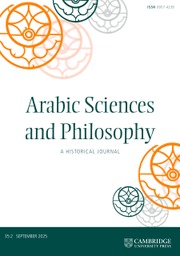ONE ASPECT OF THE AVICENNIAN TURN IN SUNNĪ THEOLOGY
Published online by Cambridge University Press: 01 March 2004
Extract
Most scholars of Islamic intellectual history now agree on the distortedness of the traditional Western portrayal of al-Ġazālī (d. 1111) as the defender of Muslim orthodoxy whose Incoherence of the Philosophers (Tahāfut al-falāsifa) was such a powerful critique that it caused the annihilation of philosophical activity in Islamic civilization. Some in fact are coming to the conclusion that al-Ġazālī's importance in the history of Islamic philosophy and theology derives as much from his assiduous incorporation of basic metaphysical ideas into central doctrines of Sunnī kalām, as from his far more celebrated bashing of the falāsifa. What is less well known is that al-Ġazālī's role in the ‘‘philosophizing” of Sunnī theology was not a lonely struggle by a single genius, but part of a broader trend that seems to have begun during Avicenna’s lifetime and that picked up speed in the first and second generations after Avicenna's death in 1037, with the work of al-Ġazālī's teacher, the Aš‘arite al-Gˇuwaynī (d. 1085), as well as of the Māturīdite al-Bazdawī (d. 1099), work that was carried forward by dozens of subsequent members of those two major Sunnī theological schools. It is clear, in fact, that the dividing line between the Sunnī theologians commonly referred to in the later Islamic tradition as mutaqaddimūn (‘‘early” or ‘‘ancient”), and those referred to as muta’aḫhḫirūn (‘‘late” or ‘‘modern”), lies not with al-Ġazālī but with Avicenna himself, and that the turn in Sunnī kalām was therefore Avicennian, not Ġazālian.
- Type
- Research Article
- Information
- Copyright
- © 2004 Cambridge University Press
Footnotes
- 39
- Cited by


